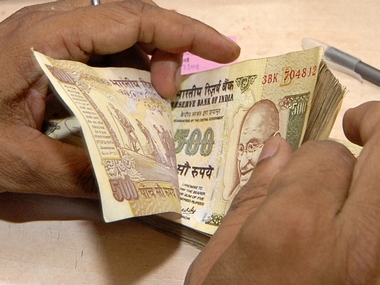The news of the higher-than-expected government borrowing for the second half of fiscal 2011-12 drove up bond yields across segments. Ten-year government bond yields rose 9 basis points (bps, where 100 bps make 1 percent) while 10-year corporate bond yields rose 7 bps on the back of the borrowing announcement.
The government is scheduled to borrow Rs 220,000 crore through dated securities in the second half of fiscal 2011-12, higher by Rs 52,872 crores than the budgeted borrowing of Rs 167,128 crores (the budget had given a full year figure of Rs 4,12,817 crore) . The government claims a shortfall in small savings of Rs 27,000 crore as the factor responsible for the higher borrowing.
[caption id=“attachment_96783” align=“alignleft” width=“380” caption=“The result of government’s tight finances is that cost of borrowing for corporates has gone up. Reuters”]  [/caption]
Government finances, which were extremely comfortable last year, are in a mess this year. The government was running a surplus balance throughout last year with windfall gains of Rs 1,06,000 crore from 3G and broadband spectrum auctions. This year the government has consistently been in deficit with the Reserve Bank due to a mismatch in revenues and expenditures.
The result of government’s tight finances is that cost of borrowing for corporates has gone up. Benchmark AAA-rated corporate bond yields are up by almost 50 bps in this fiscal year to date while yields for lower-rated papers are higher by 75-125 bps. Corporates are finding it difficult to access the bond market, as markets are demanding high yields for lack of liquidity.
Banks have also pushed corporates to the wall by hiking loan rates by a wider margin than even the rates quoted in the corporate bond market.
Overseas funding has also become expensive. The depreciation in the rupee by 10 percent against the USD and the rise in credit spreads by over 200 bps in the global credit markets have made overseas markets almost inaccessible to most companies in India. Corporates in need of funds are pushed to the wall and are forced to pay exorbitant rates for funds. They are also postponing capital expenditure as a result of lack of funds at reasonable rates.
The message to corporates is clear. Government sops and fiscal stimuli come with a hefty price. Corporates run to the government for support when the going gets tough. Stimulus packages, tax breaks, etc, are given whenever corporates complain of a slowdown in sales or profits. The government obliged them after the credit crisis of 2008, by increasing spending to take up fiscal deficit by 3 percent to shore up the economy.
Unfortunately, the government has never been able to fully roll back the tax breaks given to corporates as raising taxes is never seen in a good light by the markets. Lower tax rates coupled with an expected slowdown in GDP growth in 2011-12 are keeping government finances tight.
The extra government borrowing of Rs 53,000 crore may not be as bad as it is made out to be by kneejerk market reactions. Bond markets will initially find it difficult to digest the first Rs 15,000 crore auction in the first week of October and will demand higher yields. However, going forward, the markets will look at the inflation trajectory and expected policy actions by the Reserve Bank for yield direction.
The next time corporate bodies run to the government for help, they should stop and think about future repercussions. Unfortunately the damage is already done and many corporates unable to raise funds will go down the drain.
Arjun Parthasarathy is the Editor of www.investorsareidiots.com, a web site for investors.


)
)
)
)
)
)
)
)
)



